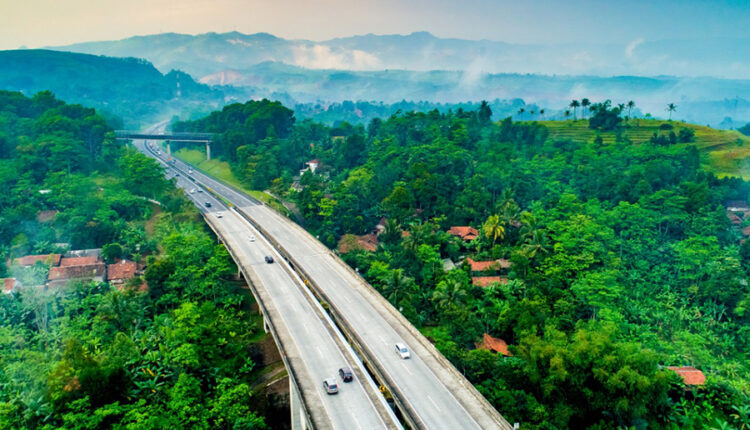Infrastructure Development in the Jokowi Era Increases National Competitiveness
By: Gavin Asadit )*
Infrastructure development in Indonesia has become one of the main focuses of President Joko Widodo’s (Jokowi) administration. Since his inauguration in 2014, Jokowi has emphasized the importance of infrastructure as a key driver of economic growth and increasing national competitiveness. In this context, various infrastructure projects, both in urban and rural areas, have been implemented with the aim of improving connectivity, facilitating the distribution of goods and services, and encouraging the growth of local industries.
President Joko Widodo said that it is important to develop infrastructure in various regions, because good infrastructure can have a positive impact on the economy so that it can increase the competitiveness of economic growth in various regions which will have an impact on the national economy becoming stronger and more globally competitive.
Good infrastructure is the backbone of a country. Without adequate infrastructure, the economic potential of a region cannot be utilized optimally. Good connectivity between production areas and markets can increase distribution efficiency, reduce logistics costs, and ultimately make local products more competitive in domestic and international markets. In this context, infrastructure development is very important to increase Indonesia’s competitiveness in the global arena.
The Jokowi administration has launched various infrastructure programs that include the construction of roads, bridges, ports, airports, and other transportation facilities. One of the major projects in the spotlight is the construction of the Trans-Java toll road, which connects various provinces on the island of Java. This project aims to reduce congestion and speed up the flow of goods and services across Indonesia’s most populous island.
In addition, the development of ports and airports is also a priority. Patimban Port in West Java and Yogyakarta International Airport in Kulon Progo are real examples of this effort. Patimban Port, which is expected to support the development of the automotive industry, will strengthen logistics connectivity and facilitate market access for local products. Meanwhile, Yogyakarta International Airport is expected to support the tourism sector, which is one of the mainstays of the Indonesian economy.
In addition to large projects in Java, the government also pays attention to remote areas and less developed areas, such as North Maluku. In a news report from the National Standardization Agency (BSN), it was stated that BSN supports the development of quality infrastructure to improve leading industries in North Maluku. This shows the government’s commitment to not only focus on growth centers, but also pay attention to areas that have economic potential but are constrained by inadequate infrastructure.
Meanwhile, Deputy for Implementation of Standards and Conformity Assessment of BSN, Zakiyah said that her party is committed to supporting the government’s efforts in strengthening quality infrastructure to improve the competitiveness of superior products in the domestic and global markets. In line with this, the Head of Bappeda of North Maluku Province, Muhammad Sarmin S.Adam said that the competitiveness of local products needs to be improved by implementing good standardization in order to realize superior products that can improve the competitiveness of national products in the global arena.
By improving the quality of infrastructure in North Maluku, it is expected that there will be an increase in the competitiveness of local products, especially in the fisheries and agriculture sectors. Good infrastructure will facilitate access for farmers and fishermen to reach wider markets, thereby increasing their income.
Infrastructure development in the Jokowi era is also closely related to increasing connectivity. Good connectivity not only impacts physical transportation, but also digital connectivity. The government has made efforts to expand internet access throughout Indonesia, especially in remote areas. Good internet access allows small and medium enterprises (SMEs) to reach a wider market and promote their products online.
In addition, good connectivity also facilitates the flow of information and innovation. In an increasingly connected world, the ability to adapt quickly to market changes is key to maintaining competitiveness. With adequate infrastructure, business actors can easily obtain the latest information on market trends and technology, which in turn can increase their competitiveness.
Despite much progress, challenges in infrastructure development in Indonesia remain. Funding issues, bureaucracy, and environmental constraints often hamper the development process. However, the government continues to strive to overcome these obstacles, including by involving the private sector in infrastructure projects.
In the future, the community’s hope is that infrastructure development will not only focus on quantity, but also on quality. The infrastructure built must be of high standards, environmentally friendly, and sustainable. Thus, the benefits of infrastructure development can be felt by all levels of society and not only focused on business interests alone.
Infrastructure development in the Jokowi era is a strategic step to increase national competitiveness. Through various projects implemented, the government seeks to create better connectivity, strengthen local industries, and encourage equitable economic growth. Although challenges still exist, the government’s commitment and support from various parties will be key to ensuring that Indonesia’s infrastructure can compete globally. With adequate infrastructure, Indonesia has great potential to become one of the economic powers in Southeast Asia and the world.
